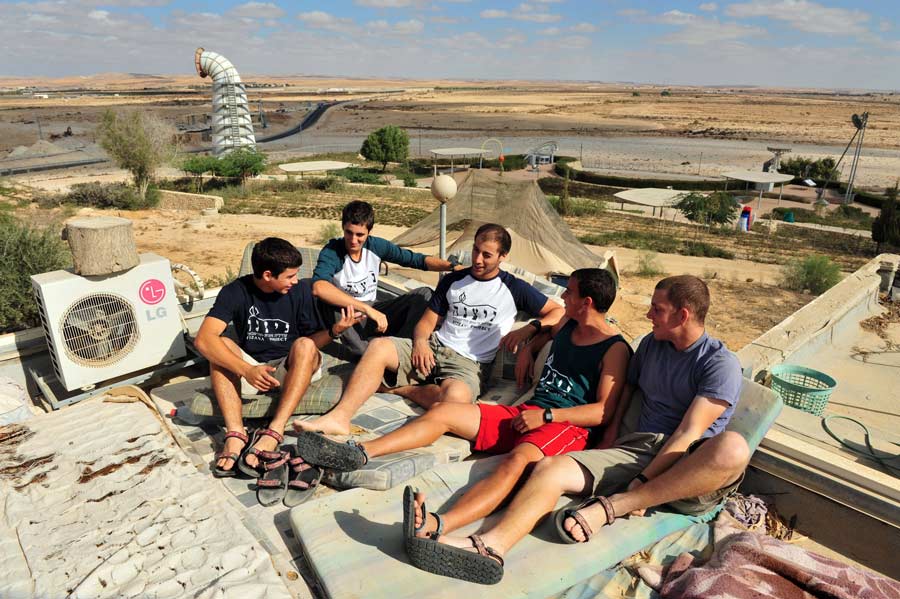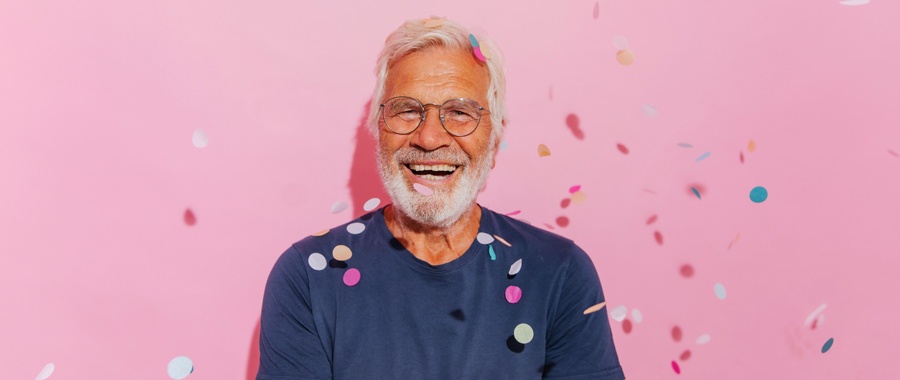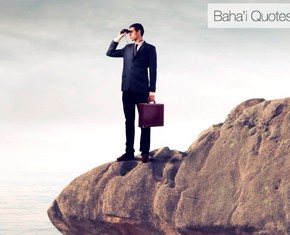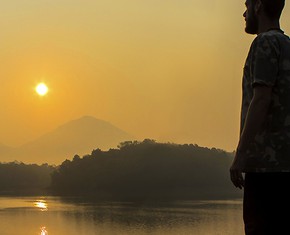The views expressed in our content reflect individual perspectives and do not represent the authoritative views of the Baha'i Faith.
This week I will celebrate my 40th birthday for the second time. No, I’m not 80-years-old. Rather than counting the years since my physical birth, I am counting the years since I joined the Baha’i Faith.
“I don’t think there is a moment, even a day when one actually becomes a Baha’i. Instead, it’s an ongoing process”
Did you notice I said, “joined the Baha’i Faith” rather than “became a Baha’i”? I used those words advisedly because I don’t think there is a moment, even a day when one actually becomes a Baha’i. Instead, it’s an ongoing process.
Abdu’l-Baha offered several explanations about being a Baha’i. Here are two of my favorites:
To be a Baha’i simply means to love all the world; to love humanity and try to serve it; to work for universal peace and universal brotherhood.
The man who lives the life according to the teachings of Baha’u’llah is already a Baha’i. On the other hand, a man may call himself a Baha’i for fifty years, and if he does not live the life he is not a Baha’i. – as quoted by J.E. Esslemont in Baha’u’llah and the New Era
To explain what happened 40 years ago I need to go back almost 50 years, to December 1970. As a university student visiting my Jewish family over the winter vacation, I joined in the celebration of Hanukkah. Throughout my childhood, this had been a joyful time, but during that visit, I felt estranged and inauthentic. I decided to undertake my own search for meaning and a vision of how to live my life. I never could have guessed where my search would take me, or how long it would take.
Please be assured that I am not demeaning the Jewish faith or its millions of followers. My own story, as I lived it then and write about it now, takes me elsewhere.
Though not expecting to find answers within religion, I studied many world religions and the related ideas of agnosticism and atheism. I accepted the idea of a divine Creator, though I didn’t think s/he was currently relevant to life on this planet. Moving away from religious enquiry, I became absorbed in abstract philosophical thought as recorded through the centuries. Feeling increasingly secular, I considered many so-called “new age” ideas and practices. Most of them fostered the idea that we are spiritual beings, but I was not satisfied with their emphasis on both self and pleasure.
Seeking practical application of concepts and principles, I next studied economic systems, including socialism and communism. Though intellectually interesting, none described a world that approached my own vision. I also investigated various lifestyles, including communal living as seen in India’s ashrams and Israel’s kibbutzim. I briefly wondered if answers might exist within politics, but I found partisanship to be antithetical to what I was seeking.

“One of the fundamental teachings of the Baha’i Faith is independent investigation of the truth”
Finally, in 1977 I met a woman named Gracie at Boston’s Hippocrates Health Institute, where we were both resident staff members. When I probed her about why she seemed so kindhearted, generous, and studious — more so than anyone else I knew — she told me she followed the teachings of the Baha’i faith. My new friend was in many ways the embodiment of this quotation from Abdu’l-Baha:
Should any one of you enter a city, he should become a centre of attraction by reason of his sincerity, his faithfulness and love, his honesty and fidelity, his truthfulness and loving-kindness towards all the peoples of the world, so that the people of that city may cry out and say: “This man is unquestionably a Baha’i, for his manners, his behaviour, his conduct, his morals, his nature, and disposition reflect the attributes of the Baha’is. – Abdu’l-Baha, Selections from the Writings of Abdu’l-Baha
A year later in Oregon, I met other Baha’is, who found me both curious and receptive. Over the next two years, I attended meetings, read books, and asked questions. One of the fundamental teachings of the Baha’i Faith is independent investigation of the truth, and the Baha’is supported me in my quest:
… each must see with his own eyes, hear with his own ears and investigate independently in order that he may find the truth. – Abdu’l-Baha, The Promulgation of Universal Peace
Finally, 40 years ago this week, I knew I wanted to join the Baha’i Faith. I phoned my friend Jan and said “I want to be a Baha’i. Come over and bring an enrollment card. Quickly, before I change my mind!” I wasn’t about to change my mind though, because I had found what I had been looking for.
“Rather than denying my Jewish heritage, the Baha’i Faith accepted and embraced it”
I loved the idea of “progressive revelation” — that God reveals His message to humanity over time through a succession of divine messengers. This means that the teachings of Baha’u’llah are relevant to our times; it also means that the truths within earlier religions needn’t be discarded. Rather than denying my Jewish heritage, the Baha’i Faith accepted and embraced it.
At last, I had found the perfect balance between logic and faith. Finally, I would be aligned with people sharing the Baha’i principles to help bring about practical results. Some of those key principles are:
- The oneness of humanity — all are spiritual brothers and sisters
- The elimination of all forms of prejudice
- The essential harmony of science and religion
- Work carried out in the spirit of service as a form of worship
- Spiritual, social, and material progress to be sought simultaneously and in balance
- The maturation of humanity and each individual’s right to their own independent investigation of the truth
- A universal auxiliary language and a standard global system of weights and measures
- A global consciousness with a shared concern for the well-being of our planet and its creatures
- Inviting others to join us in applying these teachings to carry forward an ever-advancing civilization.
“Baha’is have no clergy”
Within a few days, I was invited to meet with several members of Portland, Oregon’s Local Spiritual Assembly, the democratically-elected body of nine Baha’is that administers each local community. (Baha’is have no clergy.) The main points the members of the Local Spiritual Assembly wanted to confirm were (1) did I recognize Baha’u’llah as God’s messenger for this day, and (2) did I know about the Baha’i laws, which I would need to learn about and to obey? I still feel grateful for that meeting, as evidence of their concern for me and not merely adding new converts to the community.
So what’s life like for me as a Baha’i, and what difference has it meant? Well, if you knew me then and know me now, you wouldn’t even have to ask — it would be obvious. For example, by applying the principles as well as the laws of the Faith, I stopped using recreational drugs and alcohol, resolved financial troubles, and in countless other ways improved my daily life. Most importantly, I found a spiritual framework for facing life’s challenges, as I learned to apply the principles of the Baha’i Faith to the issues of our times. Whenever I am unsure about what to do, I ask “What will promote unity?”
I had previously felt aimless, with little sense of my place in society or the direction of my own personal development. Within the Baha’i writings and the worldwide community to which I belong, I have found a more authentic life. Throughout the world, Baha’is strive to uplift society through service, friendship to all, and infusing spirituality into daily life.
So here I am 40 years later. The question now is: Am I a Baha’i? Let’s remember that Abdu’l-Baha defined Baha’is as people who love the world, love humanity and try to serve it, and who work for universal peace and universal brotherhood. There will always be more work to do, more service to offer, and more ways to express love. Likewise, there will always be distractions, temptations, tests, and opportunities to grow.
I am not finished with my path toward the lofty Baha’i vision as expressed by both Baha’u’llah and Abdu’l-Baha. Nevertheless, I am grateful to be among people who recognize Baha’u’llah and the Faith he brought. United in our vision, aligned in our intentions, we work toward a better world, day by day.
















Comments
Sign in or create an account
Continue with Googleor